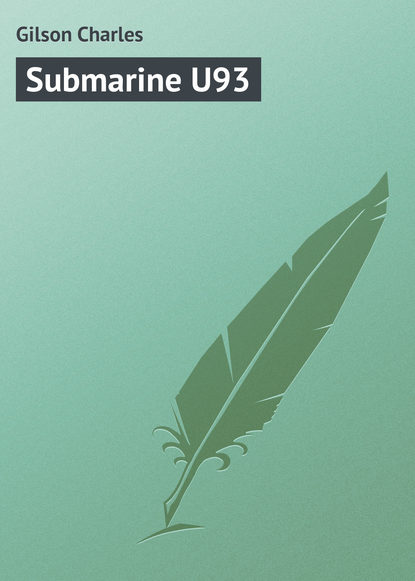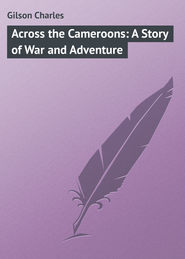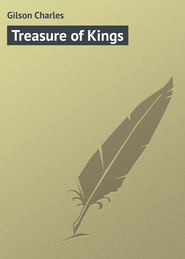По всем вопросам обращайтесь на: info@litportal.ru
(©) 2003-2025.
✖
Submarine U93
Настройки чтения
Размер шрифта
Высота строк
Поля
It was the face of Rudolf Stork. It was the same face that Jimmy had seen on that other occasion when he had been discovered hiding in the cupboard in Rosencrantz's office-with this difference, Stork had now grown a beard.
It was a black beard-coal black, and short and crisp-that made the man look more villainous than ever. Though it hid the cruel wrinkles about his mouth, it made it seem as if his lower jaw protruded like a gorilla's. Before, Stork had looked both fierce and cunning; he now gave one the impression of being akin to a savage beast.
"It's you!" cried Stork, and repeated the words several times as if unable to believe the evidence of his eyes. "It's you! By thunder, what's the game?"
"A stowaway," said Jimmy.
"A stowaway!" said the man. "I don't need telling that when I find you skulking here at dead of night, and the ship two days from port."
"Take me to the captain," said the boy. "I am ready to take the penalty for what I have done."
"You are?" said Stork. Then he must have remembered something, for thrusting his tongue into his cheek, he rolled his eyes. "Easy now," said he. "These cards must be carefully played. A stowaway!" he cried. "I'll not believe it."
"I have not denied it," answered Jimmy.
"Because you're something worse," let out the other.
"Worse!"
"Yes, worse. We're on the high seas, where a man can speak his mind without fear of contradiction; and if I choose to lay a charge who's to gainsay me? Answer me that."
"I don't understand," said Jimmy Burke.
"Ye don't, and small credit to your wits. Here's me, Rudolf Stork, a ship's carpenter, and an honest man, who goes into the hold on right and lawful business. And there what do I find prying among the cargo, like a muzzled ferret in a ditch, but a brat of a German spy, caught red-handed at his work."
Stork pointed at the packing-case upon which he had laid his chisel and hammer.
"But these tools are yours!" cried Jimmy, who now felt his cheeks burning in indignation.
"Just so," said Stork. "I left them here this morning."
Jimmy gasped. It was not easy to believe that such outrageous perfidy were possible. Indeed, it took him some little time to realize the full meaning of the man's words. But the more he thought of it the more apparent it became that he would find it extremely difficult to prove his innocence. How was he to convince Captain Crouch of the truth-that it was Stork himself who was a spy? The captain would laugh in his face. Such a retort is the common experience of fools. The cry of "You're another!" is the wit of the gutter-snipe that can never carry conviction. Jimmy recognized, with a growing sense of alarm, that in all probability he would shortly find himself in the position of an accused man who had no evidence to call on his own behalf.
"Do you mean to say," he exclaimed, "that you intend to accuse me of the very crime of which you yourself are guilty?"
"I'm here," said Stork, quite calmly, "to bandy words with no one. If I say you're guilty, then guilty you are, unless you can prove contrariwise. Which isn't likely so far as I can see."
Upon the man's face there was an expression of half-amused contempt. He had the appearance of being wholly confident and quite unperturbed. A sort of half-smile played about his lips. This augured ill for Jimmy, who realized that in Rudolf Stork he had an opponent who was both without a sense of honour and well practised in the art of deceiving others.
The man picked up his lantern, which, whilst speaking to Jimmy, he had set down upon the ground, and then turned to go. It was then that the boy made a quick movement forward in the direction of the iron ladder that led to the deck above.
"We'll go together," he cried. "Your story and mine are not likely to agree."
At that, Stork whipped round with a kind of snarl, and without a word of warning, and clenching his fist, he dealt the boy a swinging blow in the face that sent him reeling backward.
Jimmy staggered, stumbled and fell. For a moment he was half dazed. He could still see-but indistinctly, as if through a gauze screen-the flare of Stork's lantern which swung up and down, as the ship rolled from side to side.
By the time the boy had recovered his senses sufficiently to scramble to his feet he was again in utter darkness. The great boxes and bales of cargo were only just discernible in the dim light that came through the opened hatchway above. There, he could see a few stars, appearing at odd moments, to vanish almost immediately behind the narrow, long-drawn clouds that streaked a wind-blown sky. He could hear the waves, one after the other, beating violently against the sides of the ship, the water washing over the decks and along the scuttles, the rigging creaking, and the long chain of the steam steering-gear jolting, from time to time, as the great strain of a heavy sea was brought to bear upon the rudder. And then four bells rang out; it was two o'clock in the morning.
Jimmy, crossing the hold, reached the iron ladder, and set foot upon the bottom rung. The very moment he did so the figures of two men appeared upon the well-deck above, one of whom Jimmy recognized at once as Stork.
"He's in there?" asked a voice.
"Aye, aye, sir," answered Stork. "I found him at work among the cargo like a half-starved rat."
"Get down," said Captain Crouch, for the other voice was his; "go down and fish him out."
Stork was not slow to obey the captain's orders; and a moment later the stowaway found himself upon the deck, standing ankle-deep in running water, face to face with a man who was not so tall as the boy himself, and who was clothed in a suit of bright red pyjamas, the trousers of which were rolled up to his knees, so that the lower part of his legs was bare.
"Bring him along to my cabin," said Crouch. "I'll not stand talking here; it's a trifle too cold, I'm thinking, for a man who has spent a good slice of his life in the equatorial parts."
The captain led the way to the main-deck. As he ran up the companion-ladder on the starboard side, Jimmy noticed how extremely agile he was in all his movements. Though at this time of his life Captain Crouch must have been approaching fifty years of age, he was as active as a young man; and, indeed, had it not been for his cork foot, he would have been prepared to back himself in a hundred yards race against any man of not less than half his years.
On board the "Harlech" the captain's cabin was situated at the forward end of the main-deck, immediately under the bridge and next to the chart-room. Here an oil lamp was burning which Crouch turned up so high that the chimney smoked. He then picked up his pipe, filled it with his terrible and strange tobacco, and seating himself upon a plush-covered divan, proceeded to fill the room with smoke.
Stork, holding Jimmy by the sleeve of his coat, in much the same manner as a policeman takes his charge to the nearest station, led the boy into the room, and then closed the door.
"Now," said Crouch, "where's your evidence?"
Jimmy interposed. Thrusting forward both hands, in the attitude of one who begs for mercy, he implored to be allowed to speak. But Crouch, by describing a series of imaginary circles in the air with the stem of his pipe, intimated that he desired Jimmy to remain silent.
"One thing at a time," said he, "as my friend, Ned Harden, observed, when he shot a crocodile with one barrel and a rhino with the other. That was with an old-fashioned shot-and-ball gun that he got from a trader at Lokoja, in the days when there weren't above ten white men on the Upper Niger. I hear the evidence for the prosecution first, which-to the best of my belief-is in accordance with the law. Afterwards, my lad, you'll have full opportunity to speak. And now, then, what's the charge?"
Rudolf Stork told his story with simplicity, and a kind of easy tolerance, as if he was really a little bored; and though he was cleverly cross-examined by Captain Crouch, never once did he contradict his former statements. Had his evidence been given on oath, he would have perjured himself with no less assurance and without hesitation. His manner, no less than the directness of his narrative, would have deceived any jury in the world. And in any case, Captain Crouch-one who knew more than his fair share of the tricks of rogues and the ways of evil men-was led to a firm conviction that the boy was really guilty.
Stork lied his soul away-or what can remain of a soul in a man who has sunk to such great depths of infamy. He swore that he had been working in the hold that very morning, and had gone back to fetch his chisel and hammer. He had found the stowaway in the very act of opening one of the packing-cases, which he had discovered were filled with new short service-rifles for the British Army.
Crouch, when he heard this, made a wry face, and looked at Jimmy. He had not forgotten that Mr. Jason had warned him that he might find German spies on board; and though there was no direct proof, the evidence, as given by Rudolf Stork, was very black against the boy. He had no reason to doubt Stork's word. The man had been engaged at New York with a good character, and he seemed a capable ship's carpenter, who understood his work.
"Speak up, my lad," said Crouch-the expression upon whose thin, wizened face had hardened-"speak up, and say nothing but the truth."
Now, in those who are at all sensitive, indignation is one of the most deep-seated emotions that exist. Smarting with a sense of injured innocence, the boy's cheeks were already burning; and now, something rose in his throat as if to choke him, so that he found it difficult to speak. When words came, at last, they did so in a flood, and were only half coherent. Small wonder that Captain Crouch took all this as a sure sign that the boy was unquestionably guilty!
"I'll speak the truth, sir," poor Jimmy blurted out. "I know for a fact that it is this man, and not myself, who is a German spy. He is in the pay of the Prussian Secret Service, and was engaged in New York by a certain Baron von Essling, as he himself knows quite well. As for me, I came on board this ship as a stowaway, because I wanted to go to England. I wished to serve my country."
Crouch sprang suddenly to his feet.
"Enough of this!" he roared. "Do I look like a man who would swallow a yarn like that? My word, they're not over-squeamish when they take on a boy like you to do their dirty work. I've heard tell of women spies, but I never guessed they would employ mere children for the game."
"Sir," cried Jimmy, "I swear, I speak the truth."
"I'll hear no more!" Crouch almost shouted. "You know well enough that the penalty for a spy in time of war is death. I'm not quite certain whether I should be acting according to the law, if I strung you up to the yard-arm like a dead crow in a cornfield. And then, there's the cat-o'-nine-tails. Maybe, you've heard of that? If you had proved to be no more than a simple stowaway, I should have had a sort of kindred feeling; for, I ran away to sea myself, and so did Dawes, and many another sailor who's worth the salt he eats. When I was a boy, the 'cat' was not unheard of; but, nowadays, I doubt if I'd be within my rights in using it upon the likes of you."
It was then, at last, that poor Jimmy Burke broke down. He could suppress neither the sobs that were surging in his breast nor the tears that he felt rushing to his eyes. Falling into a chair that stood vacant at his elbow, he buried his face in his hands.
For a full minute his shoulders shook and trembled; and when he looked up, his face was all streamed and marked with tears. He saw that Crouch's lips were pressed tight together; there was an expression of settled and immovable resolution upon the face of the little captain. But, the bitterest blow of all was that Rudolf Stork was laughing, his white teeth visible in the blackness of his beard.
"I'm innocent!" let out the boy.









